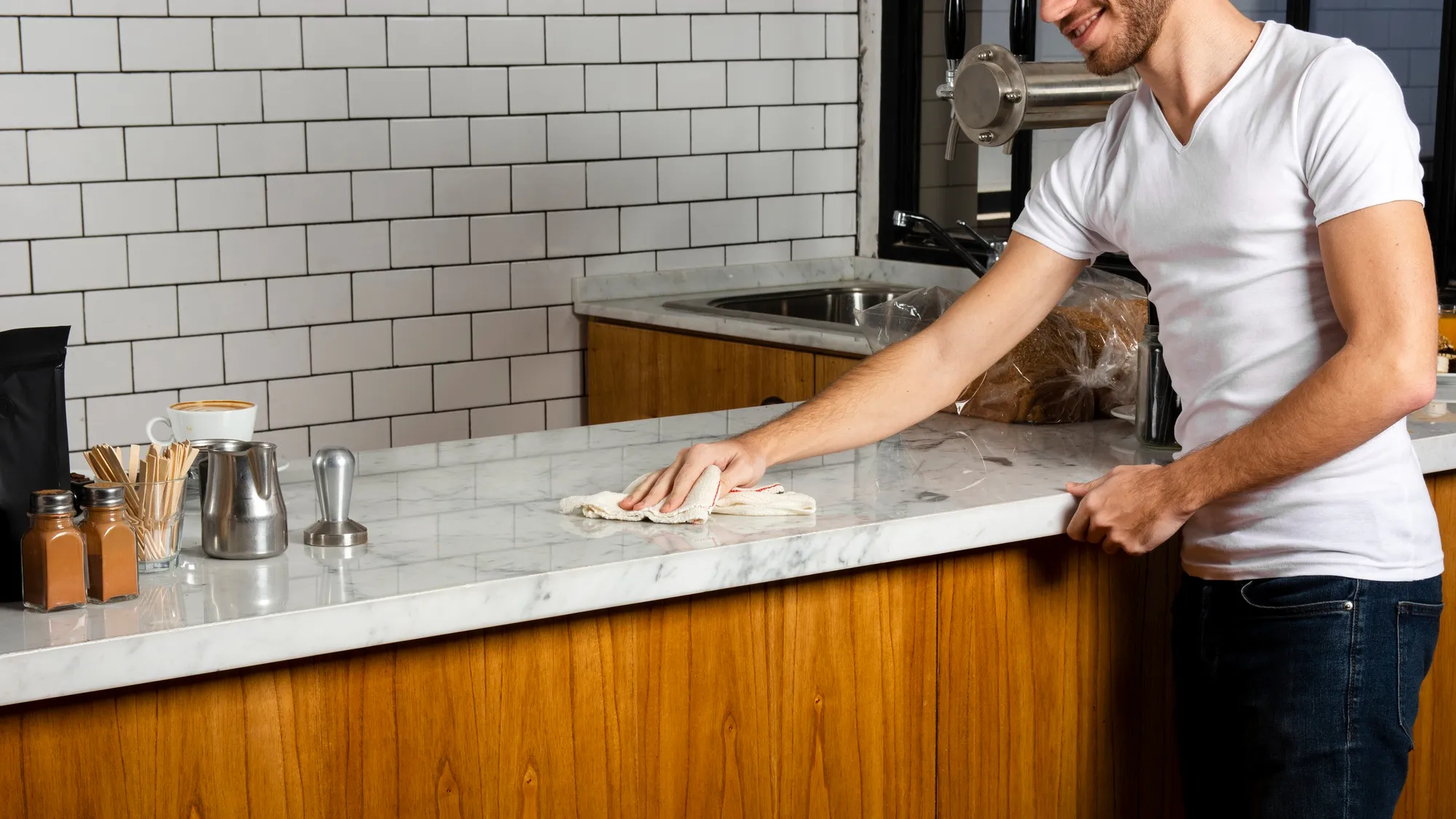How to Effectively Clean Stained Quartz Countertops

Quartz countertops are a prized choice for many homeowners due to their durability, elegance, and low maintenance. However, despite their resilience, they are not entirely impervious to stains. When the unfortunate moment arrives and you find yourself thinking, “My quartz countertops are stained. How should I clean them?”, it’s crucial to approach the task with the right knowledge and techniques to restore their pristine condition without causing further damage.
Understanding Quartz and Its Composition
Before diving into the cleaning process, it’s essential to understand what quartz countertops are made of. Quartz countertops are engineered from a mixture of natural quartz crystals and resins. This combination creates a non-porous surface that is highly resistant to staining, scratching, and heat. However, the resins used in the manufacturing process can be susceptible to discoloration or staining when exposed to certain substances over prolonged periods. Knowing this helps in selecting the appropriate cleaning method and products.
Identifying the Type of Stain
When pondering, “My quartz countertops are stained. How should I clean them?”, the first step is to identify the type of stain you are dealing with. Different substances require different cleaning approaches. Common culprits include:
- Food and Beverage Stains: Coffee, tea, wine, and tomato sauce can leave behind stubborn stains if not promptly cleaned.
- Oil and Grease: Oils from cooking or greasy foods can cause discoloration, especially if left on the surface for too long.
- Chemical Spills: Household cleaners, nail polish, or paint can leave marks that are challenging to remove.
- Hard Water Deposits: Mineral deposits from hard water can create a dull film on the surface.
Identifying the stain type will guide you in selecting the most effective cleaning method.
Basic Cleaning Techniques
For those thinking, “My quartz countertops are stained. How should I clean them?”, basic cleaning should always be the starting point. Often, a simple yet effective cleaning routine can eliminate many stains without the need for harsh chemicals.
- Mild Soap and Warm Water: Begin by using a soft cloth or sponge soaked in warm water mixed with a few drops of mild dish soap. Gently scrub the stained area in circular motions. This method is particularly effective for fresh stains and general upkeep.
- Isopropyl Alcohol: For tougher stains, dampen a cloth with isopropyl alcohol and rub it over the stain. This can help in breaking down the stain without harming the quartz surface. Once the stain has lifted, wipe the area with a clean, damp cloth to remove any residue.
- Baking Soda Paste: If the stain persists, create a paste using baking soda and water. Apply the paste to the stained area and let it sit for 10-15 minutes. Then, gently scrub with a soft brush or cloth. Rinse thoroughly with water and dry with a soft towel.
Dealing with Stubborn Stains
Sometimes, the basic cleaning methods might not be enough, especially for older or more stubborn stains. In such cases, you might find yourself still asking, “My quartz countertops are stained. How should I clean them?” The following methods are more intensive but can be very effective:
- Non-Abrasive Cleaners: Use a non-abrasive, pH-balanced cleaner designed specifically for quartz surfaces. These cleaners are formulated to lift tough stains without damaging the resins in the quartz. Apply the cleaner according to the manufacturer’s instructions, usually involving letting it sit on the stain for a few minutes before wiping it away.
- Magic Eraser: A magic eraser can work wonders on quartz countertops. Lightly dampen the eraser and gently rub the stained area. Be cautious not to apply too much pressure, as it can dull the surface over time.
- Acetone or Rubbing Alcohol: For extremely stubborn stains, acetone or rubbing alcohol can be used. Apply a small amount to a cotton ball or cloth and dab it on the stain. Immediately rinse the area with water and dry it to avoid any potential damage to the quartz.
Preventative Measures to Avoid Future Stains
After successfully cleaning your quartz countertops, it’s essential to adopt preventative measures to keep them stain-free in the future. Prevention is often easier and more effective than cleaning after the fact, especially when you’re determined not to find yourself thinking again, “My quartz countertops are stained. How should I clean them?”
- Wipe Spills Immediately: Quartz’s non-porous nature gives you a little leeway, but it’s still best to wipe up spills as soon as they happen. This prevents the liquid from sitting on the surface and potentially causing stains.
- Use Coasters and Trivets: Place coasters under drinks and trivets under hot pots and pans to protect the surface from potential staining and heat damage.
- Avoid Harsh Chemicals: Stay away from cleaners containing bleach, ammonia, or vinegar, as these can damage the resin binders in quartz. Stick to pH-balanced cleaners specifically designed for quartz countertops.
- Sealant Caution: Unlike natural stone countertops, quartz doesn’t require sealing. In fact, applying sealant can damage the surface and lead to discoloration. Let the natural properties of quartz work for you.
When to Seek Professional Help
In some cases, despite your best efforts, the stain might persist. If you find yourself repeatedly saying, “My quartz countertops are stained. How should I clean them?”, it may be time to consult a professional. A specialist can assess the stain and recommend advanced techniques, such as professional-grade polishing or even resurfacing, to restore the countertop’s original beauty.
Conclusion
The dilemma of “My quartz countertops are stained. How should I clean them?” is a common one, but with the right approach, you can keep your countertops looking as good as new. By understanding the nature of quartz, using appropriate cleaning methods, and taking preventative measures, you can enjoy the elegance and durability of quartz countertops without the worry of stains marring their beauty. Remember, prompt action and the right techniques are your best allies in maintaining the pristine condition of your quartz surfaces.




